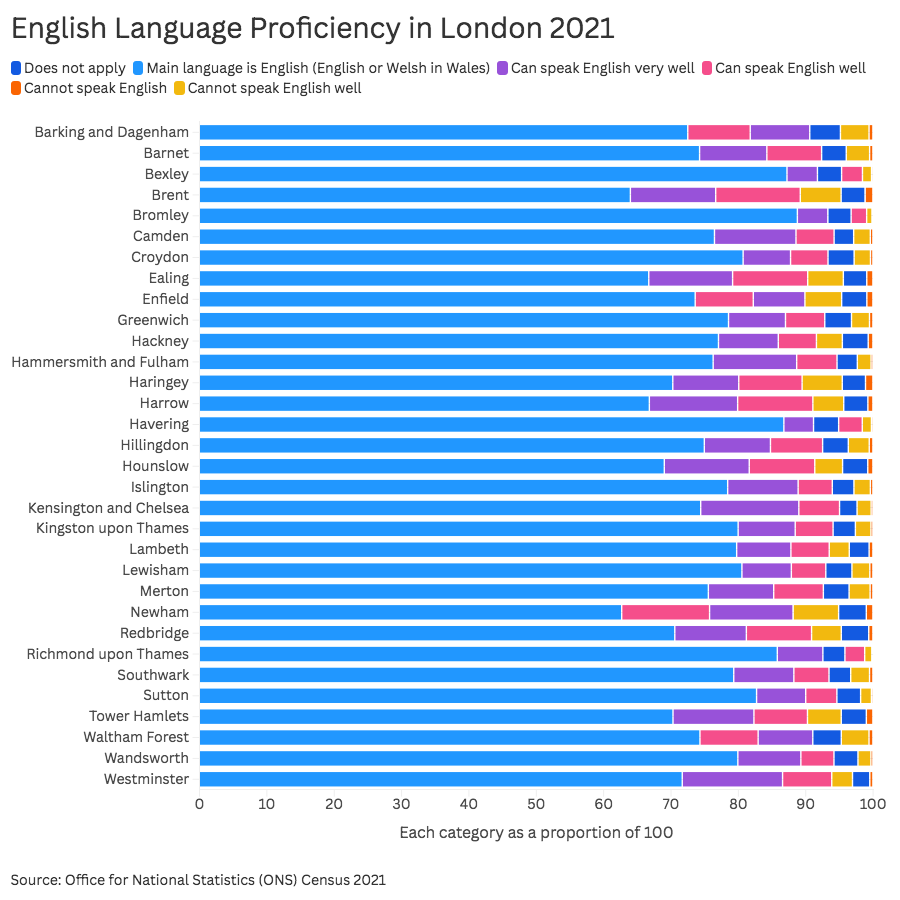Migrants will have to be fluent in English under reforms as census data shows language proficiency has dropped nationwide, with the lowest levels in London.
Prime minister Sir Keir Starmer’s immigration reforms will raise the standard for migrants from English as a foreign language GCSE to almost A-Level to aid integration.
The Times reported the new standard will require migrants to speak “fluently and spontaneously without much obvious searching for expressions” and to speak English “flexibly and effectively for social, academic and professional purposes”.
It comes as Office for National Statistics census data showed 2.8million fewer people using English as their main language between 2011 and 2021, despite a 3.5million population growth.
After English, the most commonly spoken main languages were Polish, Romanian, Panjabi and Urdu.
Almost one in five could not speak English ‘well’, while 3% could not speak English at all.
The North East had the highest percentage of people with English as a main language at 97% of residents, whereas London had the lowest percentage at 78%.
Almost seven in 100 people could only speak English ‘well’, or not at all in London, a level likely to be lower than the new standard for migrants.

Roughly three in 25 homes in London have no one in the household who uses English as their first or preferred language.
This number is highest in Brent, where one in five households have no English language speakers.
The north west borough is one of London’s most ethnically diverse, with almost two-thirds of the population from black, Asian and minority ethnic groups, second only to Newham.
The report from the director of public health and the managing director Brent Inegrated Care Partnership found that language barriers for those not born in the UK were among the factors likely to impact on residents’ health outcomes and access to services in the borough.
The TaxPayers’ Alliance found NHS trusts spent almost £114million on interpreters and translation services between 2019-2022, and it estimated this number could be more than £174million if all trusts had responded to their requests for data.
Central and North West London NHS Trust, which serves Brent, Harrow, Hillingdon, Kensington and Chelsea, spent the sixth-highest in the UK in that period with a total of £2,461,000.
Increasing English language proficiency levels is linked to having a positive impact on social cohesion too, as the Home Office identifies the number of people who are able to read and speak English as an indicator of integration.
The Migration Observatory also cites speaking English as being key the well-being, economic prospects and social connections of migrants.
There are a range of English language services available to migrants under adult skills programmes, which include classes for migrant communities known as English for Speakers of Other Languages (ESOL).
However, ESOL provision has been affected negatively by cuts in funding and eligibility since 2010.
As a result, the number of enrolments has fallen dramatically by over 45% from 179,000 to 97,260 between 2009/10 and 2020/21.
At the same time, the demand for ESOL services have grown and the need for a skilled labour force with proficiency in English is greater than ever, according to The Bell Foundation.
The Department for Education announced a review of the adult ESOL curriculum in October 2022.
This decision was welcomed by The Bell Foundation, a charity which aims to overcome exclusion through language education.
Their report in May 2024 claimed: “The curriculum is 20 years old, its linguistic framework is out of date, and it is no longer in line with research evidence on second language acquisition.”
Bell Foundation director Diana Sutton said: “Government spending is not being used effectively because adult literacy learning goals do not align well with the needs of people whose first language is not English.”
The Adult Education Budget (AEB), which funds these services, amounts to approximately £1.5billion annually.
In a boost to this budget, £6.5million was made available for ESOL for up to 25 local authorities by the previous Conservative government in 2020.
Since then, course funding has increased to 150,000 places in England in 2022/23, the highest level since 2012/13.
Yet out of the 150,000 places, only 7,260 places were for the highest level two courses, which is equivalent to GCSE grade 9-4/A*-C, still below the new level of English required.
Learning and Work Institute head of essential and life skills Alex Stevenson said: “English language skills underpin the employment prospects, integration and wellbeing of new arrivals.
“We need more urgent action to boost English language provision, alongside other essential skills such as literacy, numeracy and digital.”
Featured image: Clarissa Watson via Unsplash





Join the discussion